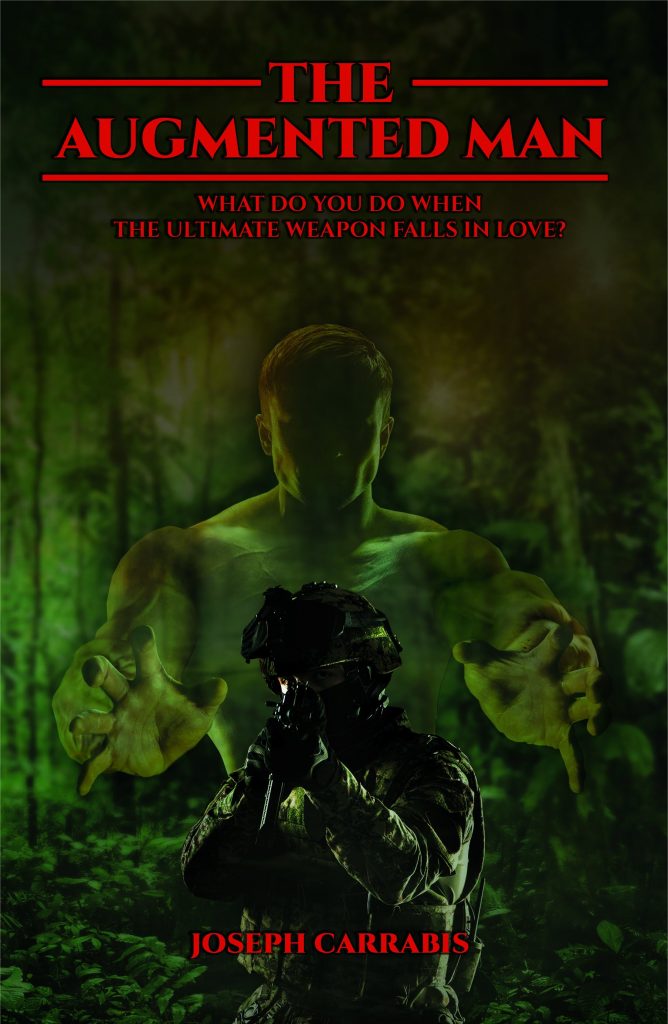Interview with Joseph Carrabis, Author of THE AUGMENTED MAN
I had the pleasure of reading THE AUGMENTED MAN, a story of a US soldier with a stormy past. Author Joseph Carrabis delves into the psychological and physical aspects of warfare and its effects on the psyche of this soldier, Nick Trailer. Mr. Carrabis shared his thoughts on various aspects of his writing and reading with me.
What kinds of books do you read?
Well written. They’re getting harder and harder to find, though. But reader friends tell me I’m persnickety about what’s well-written. Genre doesn’t matter to me, nor does fact or fiction. But well written? I don’t yield on that one.
Who are your favorite authors?
The first who come to mind are Terry Melia (Tales from the Greenhills) and Joanell Serra (The Vines We Planted), both indie authors and both have amazing talent (I’m waiting for their next books). Brautigan, Frazier, Eiseley, Fagan, Dickey, Capote. I offer two types of blog posts – Why It Works for Me and Great Opening Lines – that pretty much share what makes an author and/or their book work for me.
The writing in THE AUGMENTED MAN is highly detailed, especially the dialogue and the descriptions of the weaponry.
Thank you!
How did you research the military aspect of the novel if you don’t have a military background?
THE AUGMENTED MAN was originally written in April-May 1990, before the internet became the internet. I contacted my local police department’s armorer, the state police armorer, talked with National Guard, people in the reserve, went to weapon shops, and read read read.
What about the idea that childhood trauma can lead to dysfunctional lifestyles or mental illness?
That concept is part of the literature now. Back in the 1980s-90s it was heresy. I suspect because of the West’s social climate at the time. The Soviet Union fell, people were coming out of the “Me” decade, they were busy pointing their fingers at Gays and under-represented minorities and yelling that AIDS was god’s verdict on them, people were self-medicating with alcohol, crack, designer drugs were making themselves known, … People didn’t want to look at their childhoods, there was too much going on in the present.
What kind of research or work led you to this conclusion?
Back in the late 1980s-1990s I was active in that community. I took classes, studied, went to meetings, talked, talked, and talked with people willing to share their experiences. Similarities between adults suffering from childhood trauma and people suffering from combat PTSD became obvious to me. I went to conferences, wrote papers, and generally got shouted down or ridiculed. But that’s the rule of heresy: Crucify the heretic then accept the heresy.
One conference was an amusing example of this. I was on a panel discussing abusive relationships. I offered that anyone who willingly and knowingly returns to an abusive relationship is contributing to their abuse. They are not victims anymore but co-contributors, essentially self-abusers of a dangerous kind and again, this concept is now part of the literature. I had to be escorted out of the meeting under guard. The reaction was that violent. How dare I claim that anyone (at the time the focus was on women) who return to abusive relationships aren’t victims.
At the time, it was easier (more convenient?) to be a victim than to get well.
Are your other books science fiction as well? If not, which genre?
Recently several regular readers told me my genre is “Joseph.” This is excellent for marketing but not the greatest for career building. Whenever you see a book with the author’s name above the book title, that author has become their own genre; King, Baldacci, Patterson, Cussler, these are all examples. Anyone who buys a book based on author is making that author a genre. Anytime you read “A fantastic read! Better than King” or something similar you’re looking at an “author as genre” book because the reference is to an author, not a genre. Something like “The best SciFi read of 2021” you’re still in genre.
I say I write autobiography (every author does whether they admit it or not) and it gets sold as science fiction, fantasy, horror, children’s stories, poetry, creative non-fiction, magic realism, …
Jennifer Day, my editor, tells people the two things you’ll always find in Joseph’s stories are 1) a deep understanding of human psychology and 2) love. I’m good with that.
What are you working on now?
I have three works-in-progress as I write this. One is SHAMAN STORY, a novel. I’m also working on two short stories, A Tale of the Woods: The Little Knitty Dragon and one tentatively entitled Don Quitamo Sails, both for the Harvey Duckman series and at the request of the series editor (it’s great when an editor/publisher asks you for something. Great for the ego, the wallet, the recognition, …) and speaking of which, I need to get back to…
Thank you, Mr. Carrabis, for your interesting responses. I look forward to reading more of your work.
Daniel Oliver
Daniel Oliver has bachelor’s degrees in both Spanish and Physician Assistant Studies. In writing his debut novel, The Long Road, he drew inspiration from his experience as a physician assistant in a psychiatry ward and his own struggles with mental illness and hospitalizations.
Oliver is a resident of Baltimore, Maryland, where he enjoys the single life–and the oysters.
- Web |
- More Posts(11)
